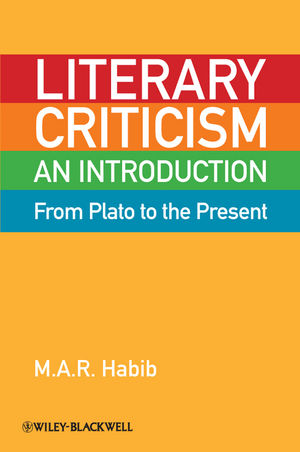|
Textbook
Literary Criticism from Plato to the Present: An IntroductionISBN: 978-1-4051-6035-3
Paperback
320 pages
January 2011, ©2010, Wiley-Blackwell
 This is a Print-on-Demand title. It will be printed specifically to fill your order. Please allow an additional 10-15 days delivery time. The book is not returnable.
|
||||||
Introduction.
Part I Classical Literary Criticism and Rhetoric.
1 Classical Literary Criticism.
Introduction to the Classical Period.
Plato (428–ca. 347 BC).
Aristotle (384–322 BC).
2 The Traditions of Rhetoric.
Greek Rhetoric.
Roman Rhetoric.
The Subsequent History of Rhetoric: An Overview.
The Legacy of Rhetoric.
3 Greek and Latin Criticism During the Roman Empire.
Horace (65–8 BC).
Longinus (First Century AD).
Neo-Platonism.
Part II The Medieval Era.
4 The Early Middle Ages.
Historical Background.
Intellectual and Theological Currents.
5 The Later Middle Ages.
Historical Background.
Intellectual Currents of the Later Middle Ages.
The Traditions of Medieval Criticism.
Transitions: Medieval Humanism.
Part III The Early Modern Period to the Enlightenment.
6 The Early Modern Period.
Historical Background.
Intellectual Background.
Confronting the Classical Heritage.
Defending the Vernacular.
Poetics and the Defense of Poetry.
Poetic Form and Rhetoric.
7 Neoclassical Literary Criticism.
French Neoclassicism.
Neoclassicism in England.
8 The Enlightenment.
Historical and Intellectual Background.
Enlightenment Literary Criticism: Language, Taste, and Imagination.
9 The Aesthetics of Kant and Hegel.
Immanuel Kant (1724–1804).
Hegel (1770–1831).
Part IV Romanticism and the Later Nineteenth Century.
10 Romanticism.
Germany.
France.
England.
America.
11 Realism, Naturalism, Symbolism, and Aestheticism.
Historical Background: The Later Nineteenth Century.
Realism and Naturalism.
Symbolism and Aestheticism.
12 The Heterological Thinkers.
Arthur Schopenhauer (1788–1860).
Friedrich Nietzsche (1844–1900).
Henri Bergson (1859–1941).
Matthew Arnold (1822–1888).
Part V The Twentieth Century: A Brief Introduction.
Introduction.
13 From Liberal Humanism to Formalism.
The Background of Modernism.
The Poetics of Modernism: W. B. Yeats, Ezra Pound, and T. S. Eliot.
Formalism.
Russian Formalism.
The New Criticism.
14 Socially Conscious Criticism of the Earlier Twentieth Century.
F. R. Leavis.
Marxist and Left-Wing Criticism.
The Fundamental Principles of Marxism.
Marxist Literary Criticism: A Historical Overview.
Early Feminist Criticism: Simone de Beauvoir and Virginia Woolf.
15 Phenomenology, Existentialism, Structuralism.
Phenomenology.
Existentialism.
Heterology.
Structuralism.
16 The Era of Poststructuralism (I): Later Marxism, Psychoanalysis, Deconstruction.
Later Marxist Criticism.
Psychoanalysis.
Deconstruction.
17 The Era of Poststructuralism (II): Postmodernism, Modern Feminism, Gender Studies.
Jurgen Habermas (b. 1929).
Jean Baudrillard (1929–2007).
Jean-Fran¸cois Lyotard (1924–1998).
bell hooks (Gloria Jean Watkins; b. 1952).
Modern Feminism.
Gender Studies.
18 The Later Twentieth Century: New Historicism, Reader-Response Theory, Postcolonial Criticism, Cultural Studies.
The New Historicism.
Reader-Response and Reception Theory.
Postcolonial Criticism.
Cultural Studies.
Epilogue New Directions: Looking Back, Looking Forward.
Index.



